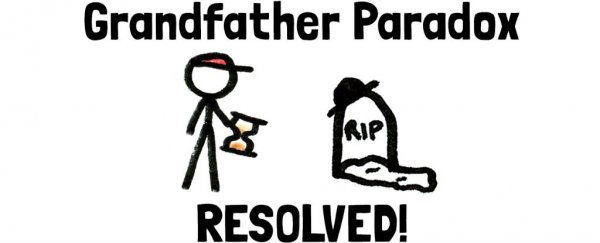The concept of time travel is complicated enough on its own without the possibility of killing a vital relative and negating your own existence. Even for time lords who aren't particularly interested in testing the limits of their own mortality by offing their teenage dad, things don't look great, because as this video explains, every time you travel back in time, you're probably killing off the previous version of yourself.
But if going back in time and killing your grandfather negates your own existence, because how coud you exist if your dad's dad didn't, do you just spontaneously vapourise the moment he stops breathing? How is that even possible?
No wait, don't try to answer this question on your own, MinutePhysics is here to help.
The first solution to this famous paradox is that when you go back in time to kill your grandfather, you're not going back to your own history, but a copy of your history, and everything you do in this version of your history will affect the alternate future of that universe, not your own.
This follows the same logic as the idea that Star Trek-style transporters are basically suicide machines. As we explained back in March, quantum physics doesn't 'allow' for perfect copies of yourself to exist - either in time travel or teleportation.
As Jennifer Ouellette explains over at Gizmodo:
"Think about it. All your atoms are scanned and destroyed in the process, because there's no cloning allowed in quantum mechanics. Then all that information about you is teleported to the new location, where a bunch of new atoms are used to build a whole new you, complete with memories, personality quirks, and that oddly shaped birthmark on your left butt cheek."
You might have been rebuilt using the exact same ingredients, whether you teleported 5 metres away or 5 minutes in the past, but you're not the same you who pushed the button on the machine.
But that's not good enough for Henry at MinutePhysics, because that solution kind of bypasses the paradox, rather than solving it. What he wants to know is what happens when you go back into your own past - not a copy of it - and alter things, what actually happens, according to physics?
Basically, if you go back in time and kill your grandfather, you don't exist, so your grandfather can't be killed. So there are two realities happening in parallel here. While all of this is 100 percent hypothetical, because no one's actually gone back in time to test this out, we do have evidence of two separate realities happening in parallel.
As MinutePhysics explains, subatomic particles regularly do multiple different things in parallel - a process known as quantum superposition. It's happening in the core of the Sun right now.
If you apply this kind of thinking to the grandfather paradox, you get something called a closed time loop, where your grandfather is simultaneously dead and alive, and so are you as a result.
But could a closed time loop actually exist, according to the laws of physics? I'll let the video above explain that one, and check out One-Minute Time Machine below to freak yourself out about time travel forever:
